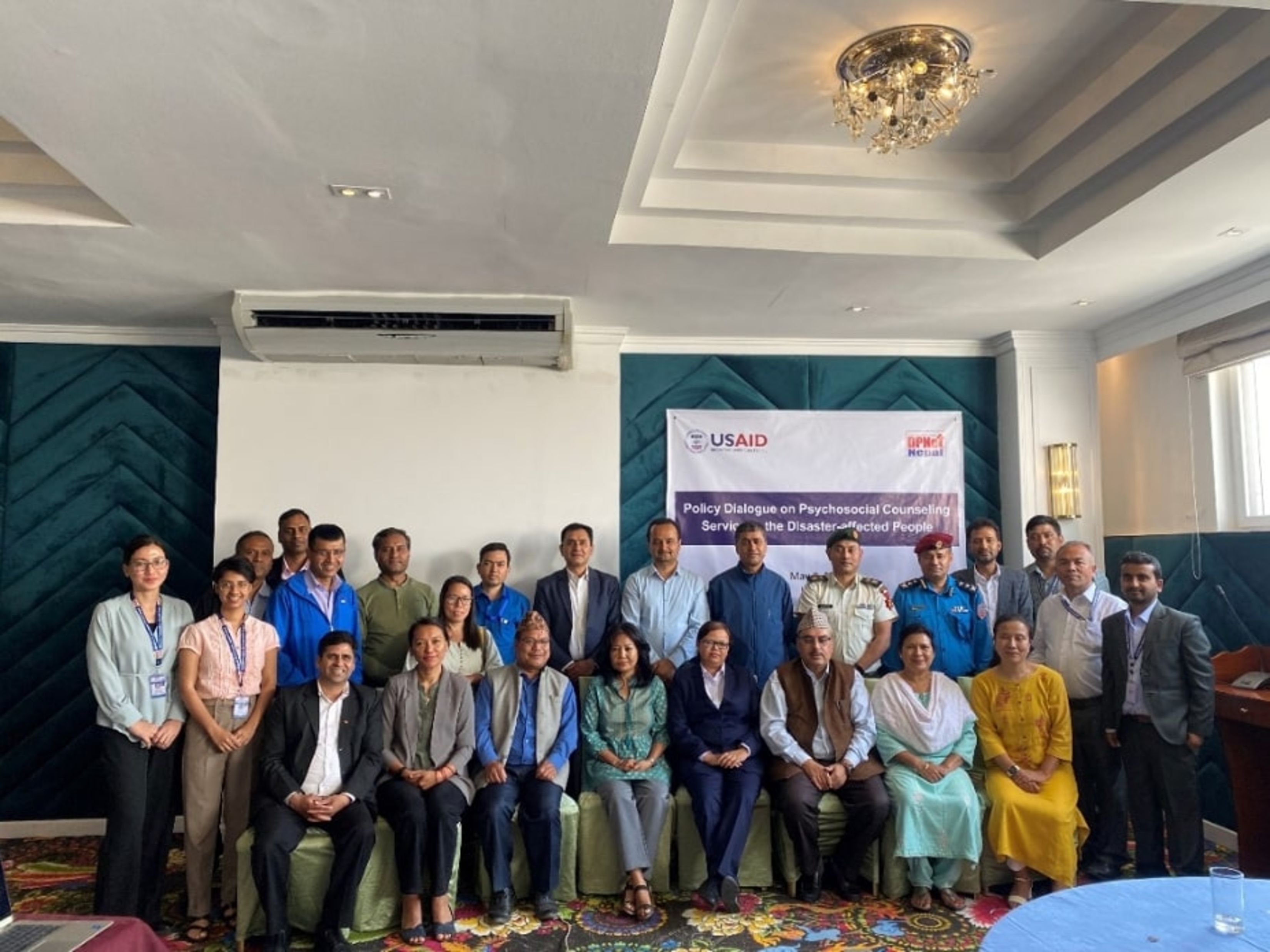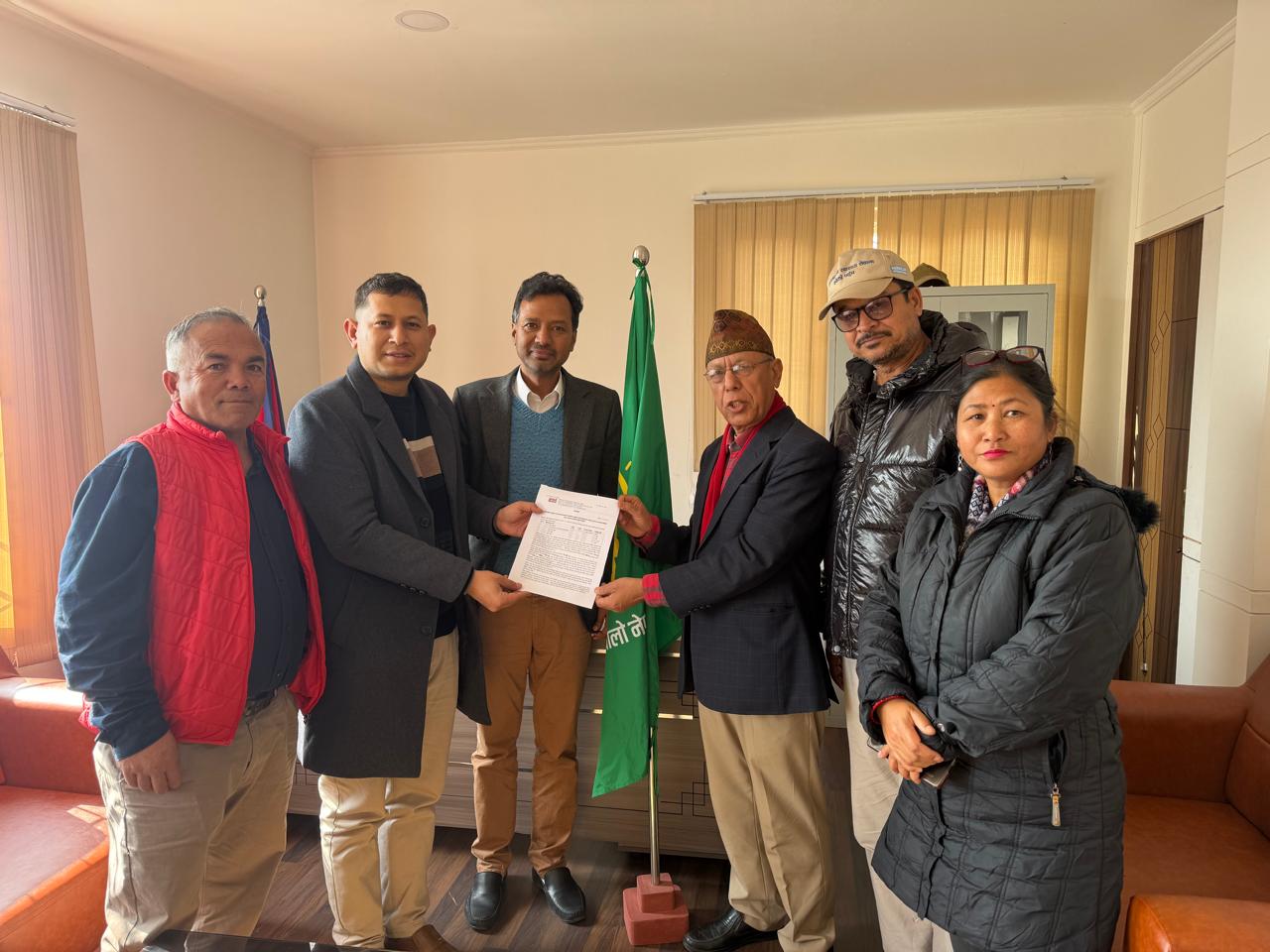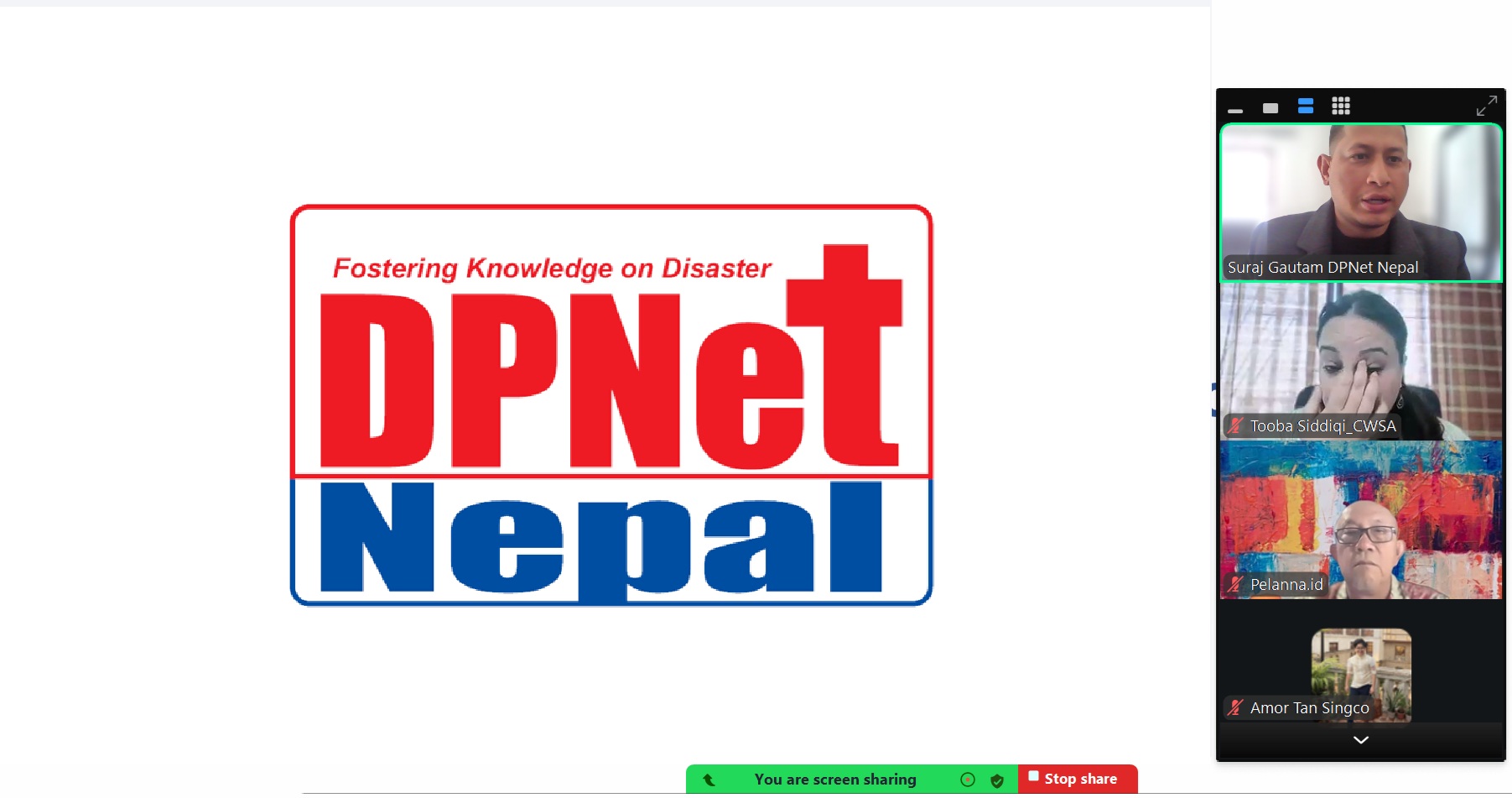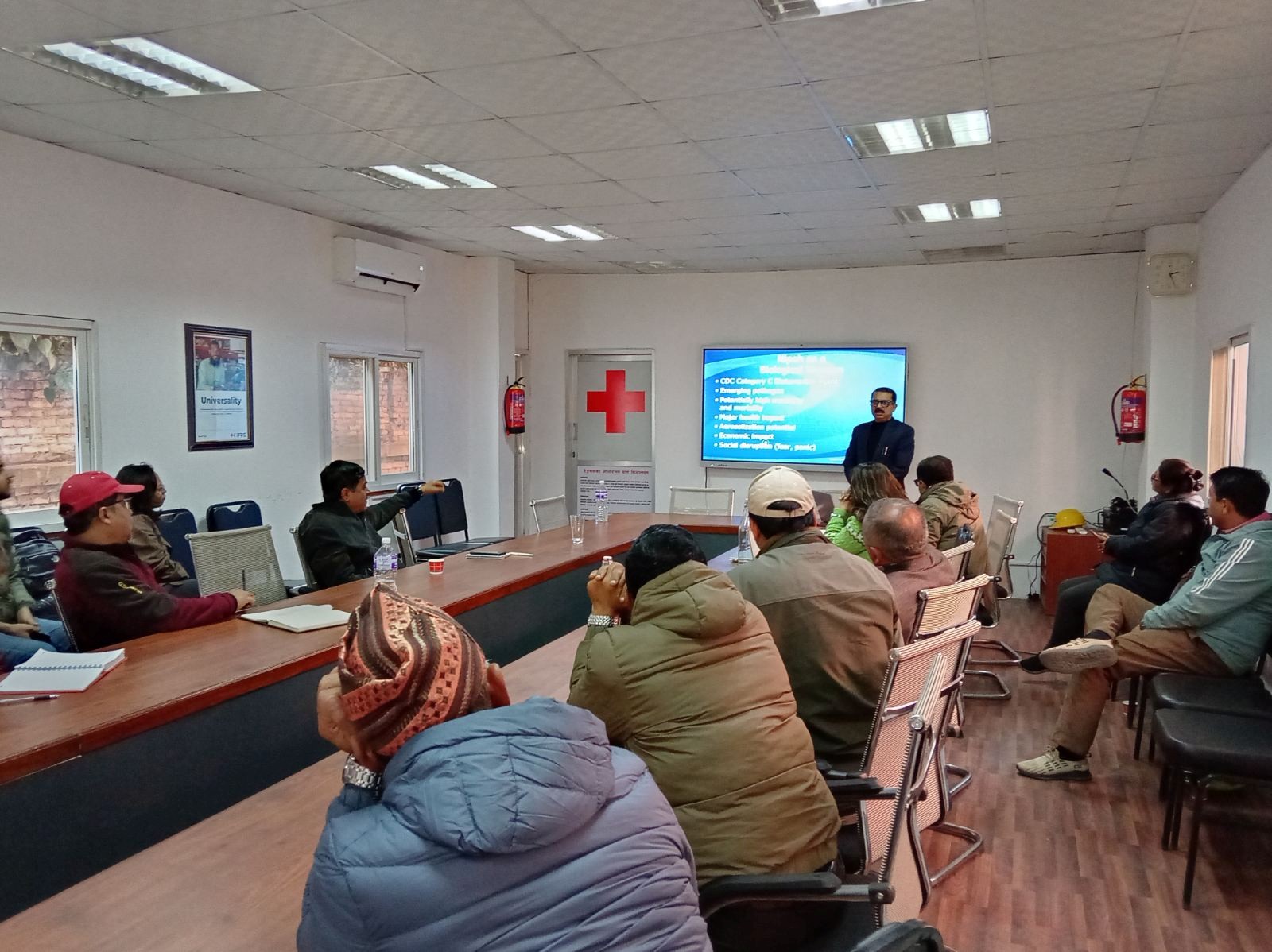DPNet Organizes a Policy Dialogue on “Psychosocial Counselling Service to the Disaster-affected People”

On May 8, 2023, the Disaster Preparedness Network-Nepal (DPNet) organized a Policy Dialogue session titled "Psychosocial Counselling Service to the Disaster-affected People” with financial and technical support from USAID/Tayar Nepal. The program aimed to raise awareness about the crucial role of psychosocial counseling in all stages of disaster management and to generate ideas and recommendations for addressing this important issue.
The session was chaired and moderated by Surya Bahadur Thapa, Chair of DPNet Nepal, and initially facilitated by Dr. Raju Thapa, Vice-Chair of DPNet. Esteemed presenter Senior Psychologist Ms. Chetana Lokshum facilitated the session with her insightful presentation. The event was attended by 28 representatives from diverse sectors involved in disaster management, including mental health professionals, government and non-governmental agencies, security forces, media, private sector organizations, and academicians.
The policy dialogue commenced with a warm welcome and an introduction by Dr. Raju Thapa, Vice-Chair of DPNet, who highlighted the program's objectives and emphasized the integration of mental health and psychosocial support (MHPSS) with disaster risk management strategies, covering prevention, preparedness, response, and recovery.
Session Chair, Mr. Surya Bahadur Thapa, further emphasized the significance and objectives of the session. He stated that The Disaster Risk Reduction National Strategic Plan of Action 2018-2030 recognizes the crucial role of psychosocial counseling in post-disaster scenarios. In order to enhance stakeholders' understanding of MHPSS within the framework of Disaster Risk Reduction, DPNet and USAID Tayar Nepal have collaborated to host a national-level Policy Dialogue. The aim is to foster a collective commitment among stakeholders to prioritize the alleviation of suffering and the enhancement of mental health and psychosocial well-being through the integration of MHPSS into disaster risk management strategies.
During her presentation, Senior Psychologist Ms. Chetana Lokshum explored Mental Health and Psychosocial Support (MHPSS) within the context of Disaster Risk Reduction (DRR). She shed light on the significance of psychological counseling throughout the different phases of the disaster cycle, including prevention/mitigation, preparedness, response, and rehabilitation/reconstruction. Ms. Lokshum highlighted the limited understanding of mental health and the social stigma surrounding psychological issues, emphasizing the need to address these challenges.
Ms. Lokshum proceeded to explain the three essential phases of psychosocial intervention. The pre-phase focuses on raising awareness, providing training, and establishing robust support networks. In the immediate response phase, Psychological First Aid (PFA) and support groups play a crucial role in offering immediate assistance. Finally, the post-phase centers around psychosocial counseling and rehabilitation, involving the expertise of psychologists and psychiatrists. Ms. Lokshum stressed the urgent need for psychosocial support programs to mitigate the risk of compassion fatigue among service providers and to educate community workers about their boundaries and limitations in this regard.
Krishna Karkee, Disaster Preparedness and Response Specialist of USAID's Tayar Nepal, shared her valuable insights on the importance of psychological and mental health in disaster programs. This opened the discussion session, where participants highlighted their experiences, identified gaps and challenges, and proposed ways forward.
The open discussion session brought forth several key points:
1. The participants emphasized the importance of pre-disaster preparedness training and raising awareness about mental health issues that arise from disasters. They recognized the significance of psychosocial intervention in effective disaster management.
2. There was a consensus on the need for the effective implementation of existing policies and guidelines regarding psychosocial counseling at the grassroots level. This ensures that communities have access to necessary support during and after disasters.
3. The participants highlighted the importance of clear division of roles and responsibilities among various responders, including community mediators, CPSW, psychologists, and security forces. Clarity in these roles ensures a coordinated and efficient response during disaster situations.
4. A recommendation was received from the floor to establish a separate unit, known as the MHPSS in DRRM taskforce with the involvement and participation of multi-stakeholders involving in MHPSS in DRRM. The taskforce will focus on MHPSS multistakeholder discussions, actions and way forward in developing guidelines and implying the MHPSS in DRRM cycle in a vigorous manner on developing intervention strategies for mental health services and counseling before, during, and after disasters.
5. Representatives from authorities such as MOHP, NDRRMA, and Patan Mental Health emphasized the need to mainstream psychosocial counseling as a cross-cutting issue in disaster management. They stressed the importance of integrating mental health and psychosocial support into overall disaster response and recovery efforts.
6. The participants highlighted the significance of implementing the Disaster Risk Reduction National Strategic Action Plan 2018-2030, with a specific focus on Gender Equality and Social Inclusion (GESI), vulnerable groups, and excluded communities. They emphasized the need for targeted psychosocial counseling and mental health services that address the unique challenges faced by these groups.
In his closing remarks, Session Chair Mr. Thapa assured the attendees that DPNet would take the initiative to continue such interactions and advocate for the integration of Mental Health and Psychosocial Support (MHPSS) within the context of Disaster Risk Reduction (DRR). He emphasized the importance of these discussions and recommendations in enhancing disaster interventions and integrating MHPSS into disaster management strategies. He added that DPNet Nepal will gladly take the lead in formation of the taskforce and work on way forwards focusing on MHPSS multistakeholder discussions, actions and way forward in developing guidelines and integrating MHPSS in DRRM cycle in a spirited manner.
While acknowledging that achieving this integration may require sustained efforts, Mr. Thapa expressed hope for the collective participation and collaboration of all stakeholders. He extended his gratitude to USAID Tayar Nepal and all the expert and practitioner participants for their valuable contributions to the program.











